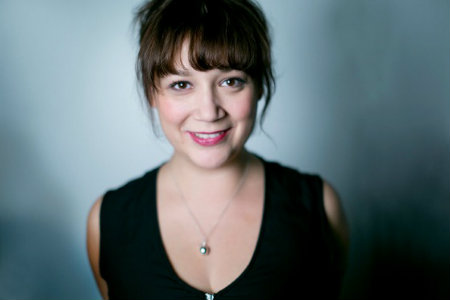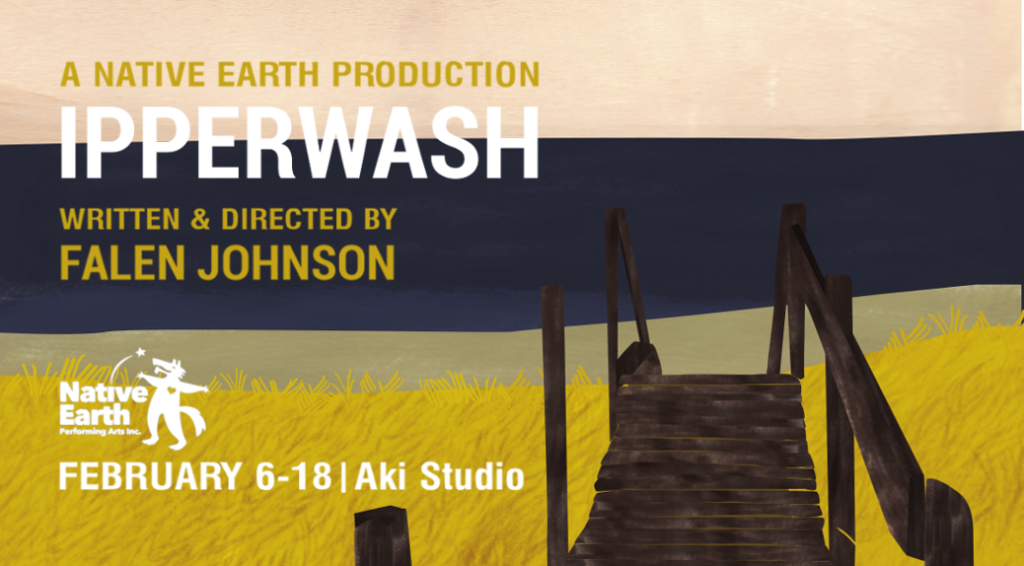Native Earth Performing Arts‘ production of Ipperwash, written and directed by Six Nations playwright Falen Johnson is set to premiere this upcoming week. Ipperwash tells a fictionalized story based on real events, developed through conversations with community members. Following an Anishinaabe Corporal who visits Camp Ipperwash for ordnance clean-up, the play shares an intimate story of resilience of the Stoney and Kettle Point communities who have been forcibly evicted from their land.
HM: I read the play was commissioned for the Blythe festival. Is this how the idea for Ipperwash began?
Falen Johnson (FJ): It was orginnally commissioned by Gil Garratt of the Blyth Festival. He approached several writers to work on a play about Ipperwash. The impetus came from Gil; he wanted to do something for the community. He wanted to build a relationship with people in the area; [highlight the] importance of telling their stories. [Many writers had moved on by this time], so I was excited to help tell the story.

HM: Can you share a bit about the writing process… your research, speaking to members of the communities, and so on?
FJ: It took time to get to know that piece of land, and getting to know the community. We really didn’t know what we were going to do when we were researching. We just said, “let’s go! We’re going to see what happens…” We stopped at a chip wagon, met people there, and told them of the project. The woman who worked at the chip wagon became one of our consultants.
At the same time, I started to ask if anyone I knew also knew people from these communities. This helped plant a seed… it felt very natural… a very organic thing in terms of relationship building. We met people who introduced us to other people. Once they knew us and knew we had good intentions… that we did not want to sensationalise the story, or never come back, a lot of people were more open to talking. We also had meetings with elders, band council… it’s not my people so it felt we did need those permissions… to give us the green light for the project.
HM: In this version of the play, you address many themes… the main character (Bea) not knowing much about the community and the events at Ipperwash; issues of complicity; while also bringing to light the resilience of these communities. Can you speak more about these?
FJ: When we knew we were remounting the play, I met with a few people because I knew I wanted to do some rewrites. I’d say about 80% is a rewrite. I wanted it to be more of a narrative piece this time around. I’m excited to see how this story is taken in by the audiences.

I also knew [the story] had to be fictionalised. I took the idea of what happened there, and use that as a filter to be able to tell the story. People in the play represent people in the community. A lot of [this rewrite] came from meeting with the community. We wanted to tell the story that hasn’t been told, which is the WHY of the crisis… the years of history.
Having a character [Bea] who is not from there is a good device. I made Bea from New Credit because they’re my neighbours – they’re Anishinaabe speaking as well. I have a relationship with that community… I also wanted to address questions about how an indigenous person joins the armed forces. How does an indigenous person fight for a country that hasn’t really supported our people.
I know [the play] sounds heavy but there’s humour in there… I try to layer in humour because that it’s an important way to learn. People learn better when they’re laughing.
HM: In this production of Ipperwash, you are also directing. How do you combine your role as playwright with that of director?
FJ: It’s my first time directing… well there aren’t a lot of us (female) Indigenous directors right now. It is a balancing of roles… I was nervous starting out but it’s been quite easy. The actors and the team are so easy to work with. [We] have the opportunity to keep evolving. Also, Gil [Garratt] has come to be in the room with me [during rehearsals] to lean on, which is great. The designers are also great. It’s such a good team!
HM: After showing here in Toronto, where does Ipperwash take you next… Or what is next for you?
FJ: Me personally, I have a podcast [The Secret Life of Canada]. That’s my immediate focus now. I’m also going to Victoria to direct one of my other plays. [For Ipperwash], I’m not sure what is happening next. This piece needs a home to live in for a while — it has a different production value.
Ipperwash premieres February 6 and runs until February 18 at Aki Studio. Tickets range from $22-25. For tickets and information on special PWYC and other events, please visit nativeearth.ca.
Photos by Kaytee Dalton. Visual art by Julie Flett.














 The 64th #Toronto Outdoor Art Fair, Canada’s
The 64th #Toronto Outdoor Art Fair, Canada’s